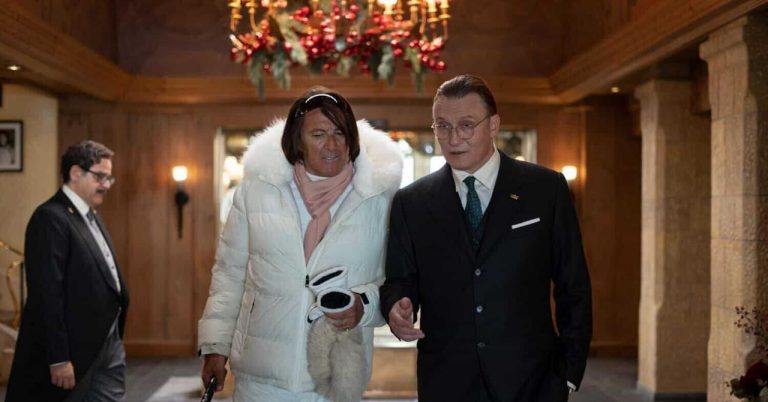The devil does not exist: the cry of anger in four acts by Mohammad Rasoulof (review)
The director of A Man of Integrity attacks the death penalty in Iran. An angry and angry plea, filmed clandestinely, but which does not forget to be grandiose and romantic.
In 2021, Iranian filmmaker Mohammad Rasoulof delivered a striking work with The devil does not exist. A film composed of four stories around four men forced to inflict death which had stunned the editorial staff of First. This shock, awarded the Golden Bear in Berlin in 2020, is broadcast for the first time unencrypted this evening at 11 p.m. on Arte and is already available for streaming on the channel’s website. Don’t miss it.
When did Mohammad Rasoulof’s cinema become angry? We are not talking about a cautious grumble or a sententious severity, no, we are talking about truly venerable anger. In 2005, his second feature film Life on the water told of the existence of a community of poor people eking out a living on an abandoned oil tanker. The picturesque description of these refugees (imagine Waterworld auteur cinema style) was a way of describing Iran at the beginning of the century, especially at the moment when the self-proclaimed “captain” decides to waterboard a young man guilty of having tried to flee the ship. The picturesque gives way to an endless, almost unbearable sequence of political torture: suddenly, we were no longer smiling, and Rasoulof threw back in our faces – under the cover of a film approved by government censorship – a certain reality that we thought we could forget, for the duration of a film.
After Life on the water, things will be clearer. Gone are the days of metaphors. Arrested and convicted by the courts of his country for illicit filming, Rasoulof will now film semi-clandestine, trying to go under the radar – and his films will not be distributed in France until the explosive A man of integrity in 2017 hits us in the face: the story of a man, a humble fish breeder who tries to fight against the corrupt and the powerful, a sort of Bronson-movie Iranian style (a story about watermelons which reminded us well Mister Majestyk, we’re not doing it again), but not at all in the relaxed and cool register. We felt it well: A man of integrity fueled by anger, pure and uncut.
Same for The Devil does not exist It’s a sketch film – we’ll rather say “chapter film” so as not to give the impression that we’re laughing. The form of the film was dictated by the exceptional circumstances of its filming. A normal man, husband, father, admirable son, has trouble sleeping: what is worrying him? A prison guard refuses to kill: will he manage to escape? A soldier returns to the country to propose to his girlfriend: will she accept? A young student returns to Iran to spend the holidays with her uncle and aunt: what family secret will she discover? Four films in one, each using mind-bogglingly masterful cinematography and genre techniques – have we seen an underground film so well shot, edited and written? The thriller, the behind closed doors, the twisting family melodrama, the twist plot…
The first “sketch” thus ends with a nice surprise slap; the second is a real little timed escape film shot with a gun in hand and camera on the shoulder, exciting like Carpenter 70s (even the music plays a tachycardic bass). If each chapter has its own structure and its own form, it is not forbidden to try to link them after the fact by playing on similarities and connections, as part of a single general plot. The common point of which is the death penalty in Iran, and we should be careful not to treat this as an exotic subject from the antipodes as we feel – and the film sends us this anxiety – that it could come back, like that, one day, both at home and everywhere else.
Rasoulof’s film is very reminiscent of the great A Touch of Sin by Jia Zangke: like his Chinese comrade, the Iranian went from Bressonian realism to an excessive sketch film (and in four parts, linked by an act of violence, so), fueled by anger, handling social denunciation as if ‘other the shotgun. For Rasoulof as for Zangke, the engine of anger is violence. Violence of society – of its power structures, precisely. If you came out ofA man of integrity angry, “with the desire to burn cars” as we wrote at the time, be warned: in front of this immense, dizzying film, The Devil does not existhas four times, we experience the same sensation caused by its lyrical cousin, A hidden life by Malick (Rasoulof also magnificently films the landscapes of Iran during the third and fourth chapters): the sensation of experiencing as truly and physically as possible the proximity of a violent end inflicted by those in power. That’s it, that’s death. But what are we waiting for to start a fire?
By Mohammad Rasoulof. With Ehsan Mirhosseini, Baran Rasoulof, Mahtab Servati…
Duration 2h30. Released December 1, 2021







